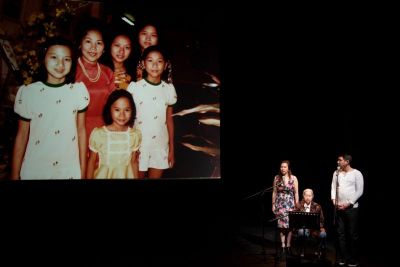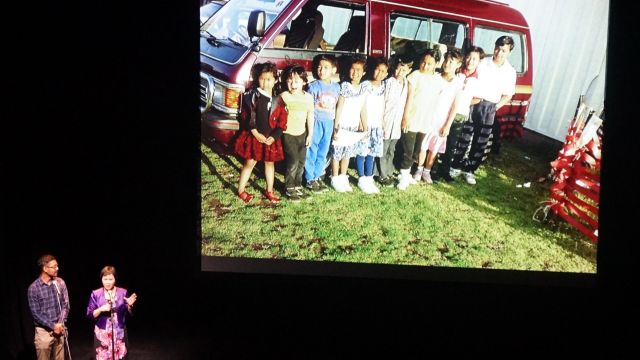Who Speaks for Me?
Performance 4a is a “professional arts company dedicated to making exceptional contemporary Asian Australian work for all audiences”, their vision being “to inspire artists and audiences to demand, embrace and realise the full potential of a richly diverse and inclusive multicultural Australia”.
The National Theatre of Parramatta (NTofP), Performance 4a and directors Annette Shun Wah and William Yang have collaborated to present this new work that explores experiences that are common to many migrants. Three Asian Australian families tell their different, yet similar, stories of leaving their homes, the camps in which they eventually found themselves, their journeys to Australia – and the trials and tribulations of learning to live … and communicate … in a completely different country.
Accompanied by much-treasured photographs, some the only keepsake they have of a past where homes and possessions were destroyed or confiscated, they tell their stories simply and honestly, sometimes using each other as translators, often reaching out to each other to re-assure and comfort. For most of them this is the first time they have spoken out publicly – but they do so with quiet confidence and candid sincerity.
 Puspa Lal Acharya and Chandra Acharya tell of fleeing Bhutan to Nepal, but constantly having to move with their four small children as each place of refuge they found became unsafe. In Australia, the story of their struggle to learn a new language, find employment, bring up their children – and establish their own businesses– is tempered with a strong sense of responsibility, community service and pride in their Australian citizenship.
Puspa Lal Acharya and Chandra Acharya tell of fleeing Bhutan to Nepal, but constantly having to move with their four small children as each place of refuge they found became unsafe. In Australia, the story of their struggle to learn a new language, find employment, bring up their children – and establish their own businesses– is tempered with a strong sense of responsibility, community service and pride in their Australian citizenship.
After her thriving business in Vietnam was destroyed by the Viet Cong, Ba Quoc Viet and her daughters began the long journey that eventually brought them to Australia. Her silver hair tied back in an elegant bun, Ba sits at a microphone, telling her story in clear Vietnamese, which is translated by her daughter Sophie. Sophie takes up the story telling of the difficulty of making her way as a single mother, and getting her hearing impaired son, William, to a specialist school, as well as learning to sign with him in English. William himself then shares his own experiences of growing up in Australia as a deaf, gay Asian boy.
Ly Heang Seang and Vanna tell the story of their flight from Cambodia: a father, pregnant mother, a naked babe-in- arms, two small boys and one tiny bag of belongings, leaving a country where they had been forced from their home to live and work in the fields. Mother and son share their story, he at first translating, then both of them in English – with sweet touches of humour and familiarity.
It is unusual for anyone to share stories such as these publicly – let alone on a stage, under lights in front of an audience almost hidden in a darkened auditorium. Yet all seven do so with grace and dignity.
Carol Wimmer
Subscribe to our E-Newsletter, buy our latest print edition or find a Performing Arts book at Book Nook.

